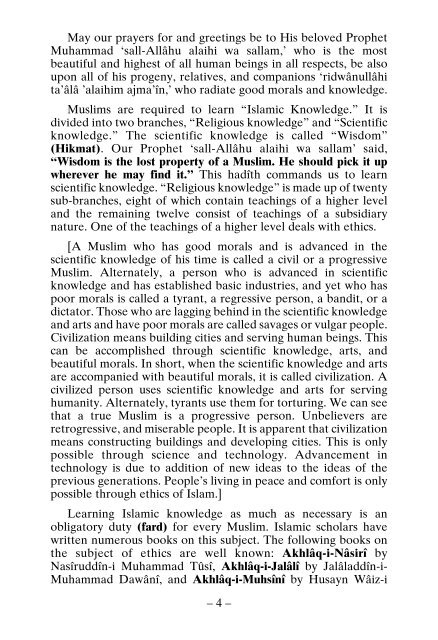Ethics of Islam
Ethics of Islam is taken from the book Berîka by Muhammad Hâdimi. Immorality and ways to get rid of it; 40 depravities and cures to them; usefulness of ethics; what is a soul; strengths of a soul; Personalities emanating from wisdom, courage, chastity and justice are extensively explained.
Ethics of Islam is taken from the book Berîka by Muhammad Hâdimi. Immorality and ways to get rid of it; 40 depravities and cures to them; usefulness of ethics; what is a soul; strengths of a soul; Personalities emanating from wisdom, courage, chastity and justice are extensively explained.
Create successful ePaper yourself
Turn your PDF publications into a flip-book with our unique Google optimized e-Paper software.
May our prayers for and greetings be to His beloved Prophet<br />
Muhammad ‘sall-Allâhu alaihi wa sallam,’ who is the most<br />
beautiful and highest <strong>of</strong> all human beings in all respects, be also<br />
upon all <strong>of</strong> his progeny, relatives, and companions ‘ridwânullâhi<br />
ta’âlâ ’alaihim ajma’în,’ who radiate good morals and knowledge.<br />
Muslims are required to learn “<strong>Islam</strong>ic Knowledge.” It is<br />
divided into two branches, “Religious knowledge” and “Scientific<br />
knowledge.” The scientific knowledge is called “Wisdom”<br />
(Hikmat). Our Prophet ‘sall-Allâhu alaihi wa sallam’ said,<br />
“Wisdom is the lost property <strong>of</strong> a Muslim. He should pick it up<br />
wherever he may find it.” This hadîth commands us to learn<br />
scientific knowledge. “Religious knowledge” is made up <strong>of</strong> twenty<br />
sub-branches, eight <strong>of</strong> which contain teachings <strong>of</strong> a higher level<br />
and the remaining twelve consist <strong>of</strong> teachings <strong>of</strong> a subsidiary<br />
nature. One <strong>of</strong> the teachings <strong>of</strong> a higher level deals with ethics.<br />
[A Muslim who has good morals and is advanced in the<br />
scientific knowledge <strong>of</strong> his time is called a civil or a progressive<br />
Muslim. Alternately, a person who is advanced in scientific<br />
knowledge and has established basic industries, and yet who has<br />
poor morals is called a tyrant, a regressive person, a bandit, or a<br />
dictator. Those who are lagging behind in the scientific knowledge<br />
and arts and have poor morals are called savages or vulgar people.<br />
Civilization means building cities and serving human beings. This<br />
can be accomplished through scientific knowledge, arts, and<br />
beautiful morals. In short, when the scientific knowledge and arts<br />
are accompanied with beautiful morals, it is called civilization. A<br />
civilized person uses scientific knowledge and arts for serving<br />
humanity. Alternately, tyrants use them for torturing. We can see<br />
that a true Muslim is a progressive person. Unbelievers are<br />
retrogressive, and miserable people. It is apparent that civilization<br />
means constructing buildings and developing cities. This is only<br />
possible through science and technology. Advancement in<br />
technology is due to addition <strong>of</strong> new ideas to the ideas <strong>of</strong> the<br />
previous generations. People’s living in peace and comfort is only<br />
possible through ethics <strong>of</strong> <strong>Islam</strong>.]<br />
Learning <strong>Islam</strong>ic knowledge as much as necessary is an<br />
obligatory duty (fard) for every Muslim. <strong>Islam</strong>ic scholars have<br />
written numerous books on this subject. The following books on<br />
the subject <strong>of</strong> ethics are well known: Akhlâq-i-Nâsirî by<br />
Nasîruddîn-i Muhammad Tûsî, Akhlâq-i-Jalâlî by Jalâladdîn-i-<br />
Muhammad Dawânî, and Akhlâq-i-Muhsînî by Husayn Wâiz-i<br />
– 4 –

















